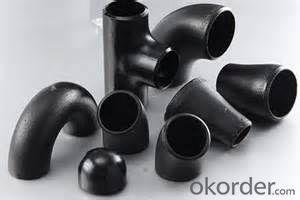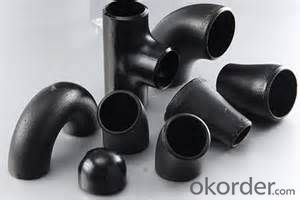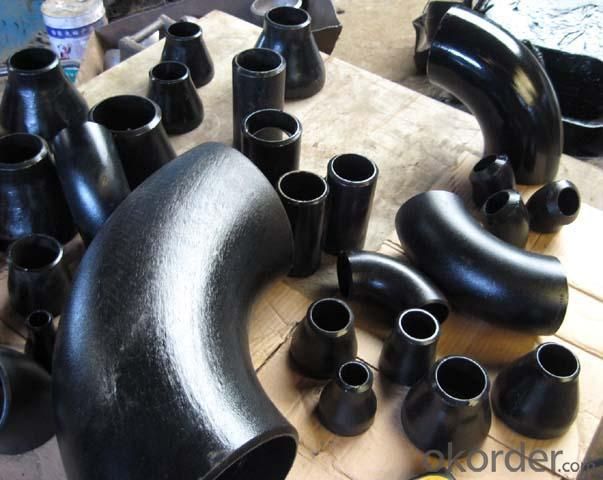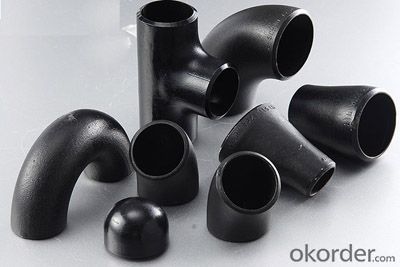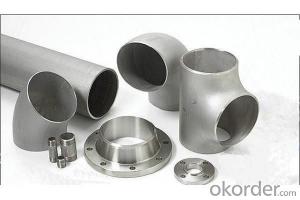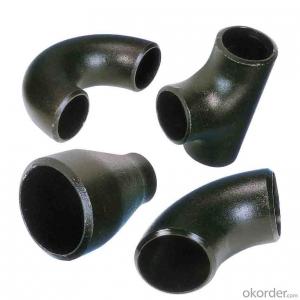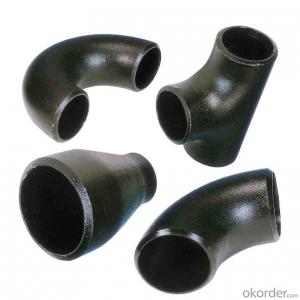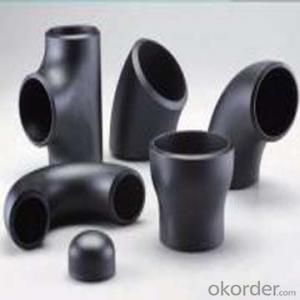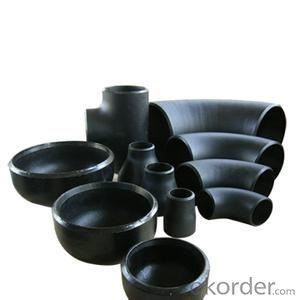Carbon Steel Tee in High Demand of Ansi b16.9 A234
- Loading Port:
- Tianjin
- Payment Terms:
- TT OR LC
- Min Order Qty:
- 100 m.t.
- Supply Capability:
- 1000 m.t./month
OKorder Service Pledge
OKorder Financial Service
You Might Also Like
Product Description:
1、Structure of Ansi b16.9 A234 Wpb Carbon Steel Tee Description:
Carbon Steel Tee made by us are perfectly in accordance with the technical specifications provided by the client. These tee are highly durable and are used to connect two or three pipes together. All these tee are light in weight and are made of high quality carbon steel.
2、Main Features of Ansi b16.9 A234 Wpb Carbon Steel Tee :
relatively light weight
optional torsional strength
support high pressure
resist corrosion
reasonable price
3、Ansi b16.9 A234 Wpb Carbon Steel Tee Images:
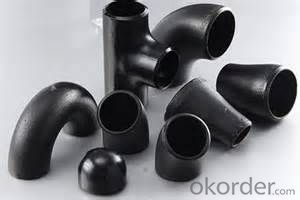
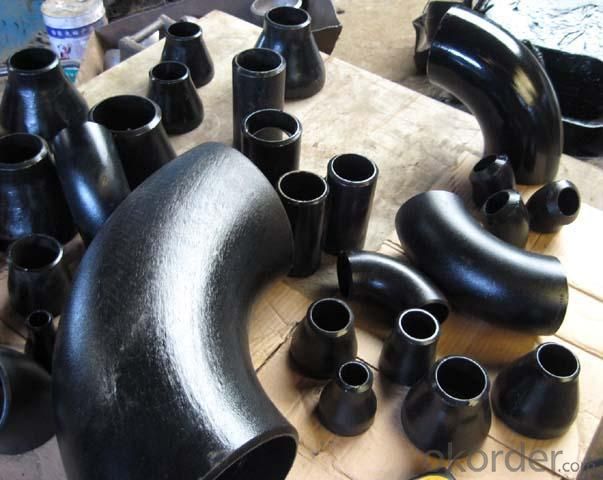
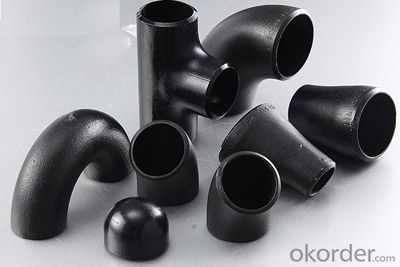
4、Ansi b16.9 A234 Wpb Carbon Steel Tee Specification:
low carbon steel tee
1 type: equal/reducing tee
2 size: DN15~DN1800
3.Thickness : 2.8~60mm.
4.standard : ans/din/gost/en/bs.
Elbow | DN15~DN1800 |
Flange | DN15~DN4000 |
Tee | DN15~DN1800 |
Reducer | DN15~DN1800 |
Cap | DN15~DN1800 |
Seamless Steel pipe | DN15~DN600 |
ERW | DN15~DN1800 |
SSAW | DN200~DN3600 |
LSAW | DN300~DN1400 |
Wall thickness | SCH10-XXS |
Carbon steel elbow | |
Other productions: | butt welded and seamless pipe fittings ,steel pipe such as tee, cross, cap, bend, 45D/90D/180D LR/SR elbow. |
Material: | Carbon steel/alloy steel /stainless steel elbow |
Size: | Seamless elbow:1/2"~24" DN15~DN600 |
Welded Elbow: 1/2”~72" DN15~DN1800 | |
Thickness: | SCH10~SCH160,STD ,XS ,XXS sch5s, sch20s, sch40s, sch80s,SGP. |
Surface treatment: | Transparent oil, rust-proof black oil hot/cold galvanized |
Productivity: | 1000 T/month |
Min order: | 100pieces |
Delivery Term: | FOB(30deposite the balance before shipment) CIF or C&F(30% deposite, the balance against with the copy of B/L) |
Remark: | 1. Special design available according to requirement 2. All the production process are made under the ISO9001:2000 ,API. |
5、FAQ of Ansi b16.9 A234 Wpb Carbon Steel Tee:
①How to guarantee the quality of the products?
We have established the international advanced quality management system,every link from raw material to final product we have strict quality test;We resolutely put an end to unqualified products flowing into the market. At the same time, we will provide necessary follow-up service assurance.
②How long can we receive the product after purchase?
In the purchase of product within three working days, We will arrange the factory delivery as soon as possible. The pecific time of receiving is related to the state and position of customers.
③ How can we get more information?
You can contact us by Email or call us directly and we will do our best to give you valuable information as much as possible but this service is not available on weekends.
- Q: Who knows what is the difference between double submerged arc welded pipe and longitudinal submerged arc welding?
- Double submerged arc welding should be for spot welding and single side welding, they are straight line welds, but double submerged arc welding seam is more beautiful and fine.
- Q: Are steel pipes suitable for underground compressed air systems?
- Yes, steel pipes are generally suitable for underground compressed air systems. Steel pipes have several advantages that make them a popular choice for such applications. Firstly, steel pipes are known for their high strength and durability, which allows them to withstand the pressure and stress associated with compressed air systems. They can handle high operating pressures without any significant risk of bursting or leaking. Secondly, steel pipes have excellent resistance to corrosion and can withstand exposure to moisture, soil, and other underground elements. This makes them a reliable choice for underground installations, where pipes may be exposed to moisture and other potentially corrosive substances. Furthermore, steel pipes are relatively easy to install and maintain. They can be welded or threaded together, ensuring a secure and leak-free connection. Additionally, steel pipes can be easily inspected and repaired if necessary, allowing for cost-effective maintenance and repairs. However, it is important to note that the suitability of steel pipes for underground compressed air systems may also depend on other factors such as the specific requirements and conditions of the system. It is advisable to consult with a professional engineer or a qualified expert to ensure that steel pipes are the most appropriate choice for a specific application.
- Q: How are steel pipes coated for aesthetic purposes?
- There are various ways to coat steel pipes for aesthetic purposes. One commonly used method is to apply a powder coating. This involves spraying a dry powder onto the pipe's surface and then heating it to create a durable and attractive finish. Powder coating offers a wide range of color options and provides a smooth coating. Another method is electroplating, which involves immersing the pipe in a solution containing metal ions and passing an electric current through it. This creates a thin, decorative layer on the surface of the pipe. Electroplating can produce shiny, reflective surfaces or more matte, textured appearances. Painting is also a popular method for coating steel pipes aesthetically. It involves applying liquid paint or enamel to the pipe's surface. By choosing different colors, textures, and finishes, painting allows for a variety of aesthetic possibilities. However, it is crucial to use paint specifically formulated for metal surfaces and capable of withstanding environmental conditions. In addition to these methods, steel pipes can be coated using techniques like hot-dip galvanizing or metal cladding. These processes involve applying a layer of another metal, such as zinc or aluminum, to the pipe's surface. This not only enhances the appearance but also protects against corrosion, extending the pipe's lifespan. Overall, there are multiple methods available for aesthetically coating steel pipes. Each method has its own advantages and should be selected based on the desired appearance, durability, and environmental conditions. Factors like color, texture, finish, and protective properties must be considered to ensure the desired aesthetic result is achieved.
- Q: How are steel pipes protected against underground corrosion?
- Steel pipes are protected against underground corrosion through various methods such as cathodic protection, coatings, and corrosion inhibitors. Cathodic protection involves the use of sacrificial anodes or impressed current systems that direct corrosion away from the steel pipes. Coatings like epoxy or polyethylene are applied to the pipes to create a physical barrier against moisture and corrosive elements in the soil. Additionally, corrosion inhibitors can be added to the fluid inside the pipes to prevent corrosion from occurring.
- Q: What does "spiral welded steel pipe" DN325*10 mean?
- Spiral welded steel pipe with nominal diameter of 325mm and wall thickness of 10mm
- Q: What are the thermal properties of steel pipes?
- Steel pipes have excellent thermal properties. They have a high thermal conductivity, which means they can efficiently transfer heat. Additionally, steel pipes have a high melting point, making them suitable for handling high temperatures without any significant deformation or damage.
- Q: What does the diameter of a steel pipe project mean?
- Generally, the diameter of steel pipe has three common diameters: outer diameter, inner diameter and nominal diameter.The first two are well understood.Nominal diameter refers to the national standard to specify the general diameter of a certain national standard pipe. It is only a model representation. It is neither outer diameter nor inner diameter.
- Q: Are steel pipes magnetic?
- Yes, steel pipes can be magnetic. Steel, which is primarily composed of iron, is a ferromagnetic material. This means that it can be magnetized or attracted to magnets. However, not all steel pipes are magnetic as the magnetic properties of steel can vary depending on the specific composition and production methods used. In some cases, steel can be made non-magnetic by adding certain alloying elements or by subjecting it to specific heat treatments. Additionally, the strength of the magnetic field that steel pipes can exhibit can vary depending on factors such as the thickness of the pipe and the strength of the magnet being used.
- Q: How are steel pipes protected against ultraviolet (UV) radiation?
- Steel pipes are typically protected against ultraviolet (UV) radiation through the application of specialized coatings or paints that act as a barrier, preventing direct exposure of the steel to UV rays. These coatings are designed to withstand UV degradation, prevent corrosion, and extend the lifespan of the pipes.
- Q: Can steel pipes be used for underground water supply networks?
- Yes, steel pipes can be used for underground water supply networks. Steel pipes are durable, resistant to corrosion, and have high strength, making them suitable for carrying water underground. Additionally, steel pipes can withstand high pressure and temperature variations, ensuring a reliable and long-lasting water supply system.
Send your message to us
Carbon Steel Tee in High Demand of Ansi b16.9 A234
- Loading Port:
- Tianjin
- Payment Terms:
- TT OR LC
- Min Order Qty:
- 100 m.t.
- Supply Capability:
- 1000 m.t./month
OKorder Service Pledge
OKorder Financial Service
Similar products
Hot products
Hot Searches
Related keywords
